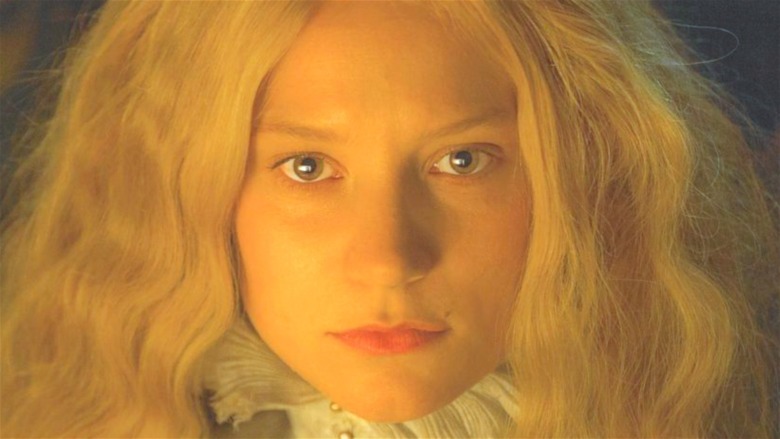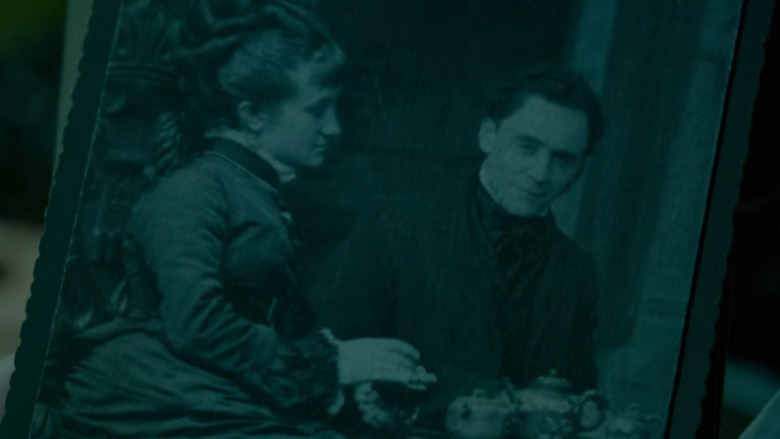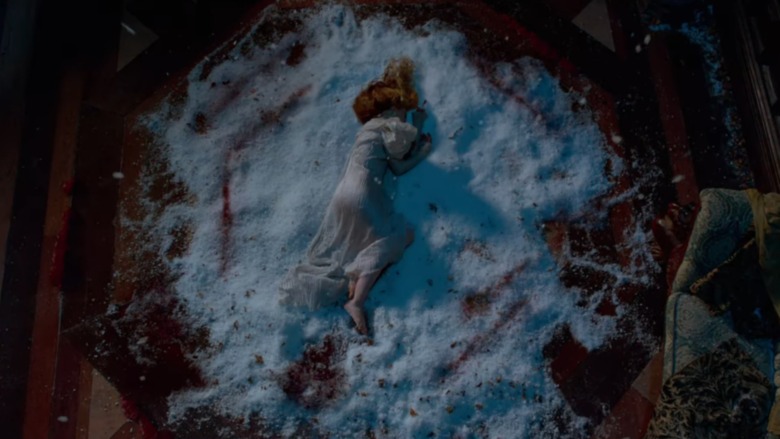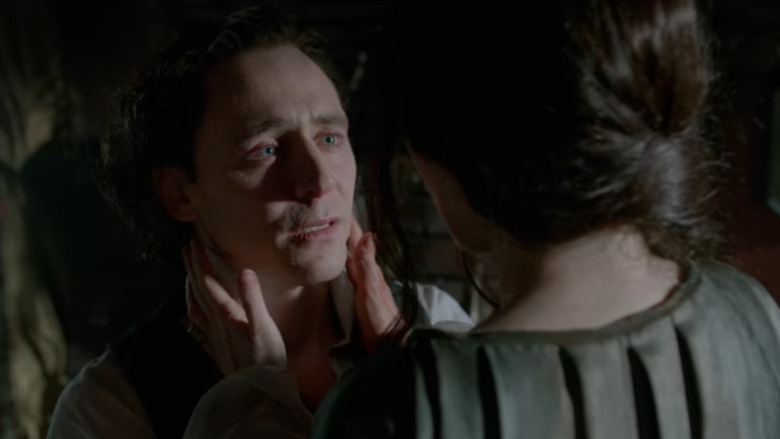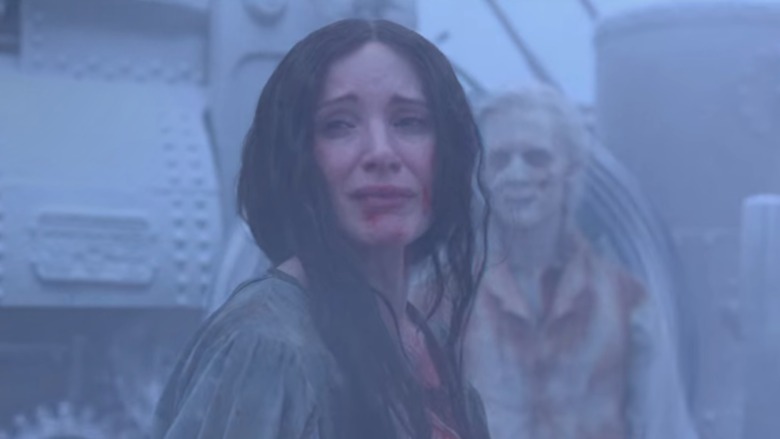The Ending Of Crimson Peak Explained
Guillermo del Toro's sumptuous ghost story Crimson Peak is a loving throwback to gothic horror classics like Rebecca and The Innocents. While del Toro's film utilizes many tropes of the genre, he turns the volume up on everything to give the movie a modern flare. The ghosts are extra gruesome in all their dripping CGI glory and the story is a twisted tale of taboo and murder.
Our heroine is Edith Cushing (Mia Wasikowska), a young writer living in New York at the turn of the 20th century who falls in love with a man named Thomas Sharpe (Tom Hiddleston). Thomas hails from England, where he lives in his family's historic home, Allerdale Hall. The estate sits atop a red clay mine, giving it the nickname Crimson Peak. Edith's father doesn't approve of the union, but after he dies unexpectedly, she decides to marry Thomas and move into his ancestral home.
Edith quickly finds that life at the Sharpe family estate is not quite what she imagined. Allerdale Hall itself is dilapidated and slowly sinking into the clay beneath it, as revenues from the mine dried up long ago. Thomas' sister Lucille (Jessica Chastain) is as cold to Edith as the winter air and soon, Edith begins seeing apparitions at night.
While the ghosts are a terrifying sight, Edith comes to realize that they do not wish her harm. In fact, they are trying to help her unravel the horrifying secrets concealed there on Crimson Peak.
Edith uncovers the shocking secrets of Crimson Peak
Edith's suspicion that not everything is as it seems at Allerdale Hall is kicked into overdrive when she finds a trunk filled with documents, as well as a cache of wax cylinder recordings, which were shown to her by one of the ghosts. The documents reveal that Thomas had previously been married multiple times, something he kept from Edith. Even more disturbing are the recordings, which include audio of one of Thomas' ex-wives claiming that she is being poisoned to death by Thomas and Lucille.
Ever since Edith arrived at Allerdale Hall, Lucille has been regularly making her tea. When she started feeling ill and weak, Edith suspected that the tea might have something to do with it, and the recording only further confirms that theory. But while Lucille never showed much kindness toward Edith, the revelation that Thomas is likely involved in these nefarious schemes is heartbreaking. While their marriage took time to warm up, a recent night away from the house resulted in Edith and Thomas finally consummating their relationship in what felt to Edith like real progress toward developing intimacy.
Unfortunately for Edith, she has competition for Thomas' affections. Later, a ghost appears to her and directs her to Lucille's bedroom. Inside, Edith finds Thomas and Lucille in bed together. They have been in an incestuous relationship since childhood and have only clung to their ancestral home by having Thomas marry rich women and then kill them for the inheritances.
Now not only do the siblings have monetary reasons to want Edith dead, but she also knows their darkest secret.
Thomas begins to have second thoughts
After the Sharpes are caught in bed together, Lucille throws Edith off one of the balconies above the foyer in an attempt to kill her. Thankfully, it's just as Edith's friend Dr. Alan McMichael (Charlie Hunnam) arrives at Allerdale Hall. After uncovering some research on the Sharpes that Edith's father had received right before he died mysteriously, Alan decided to track Edith down to warn her in person. His timing couldn't have been better
When Edith recovers, Alan reveals that he's aware of the Sharpe siblings' disturbing history. He produces a newspaper article detailing the brutal killing of Lucille and Thomas' mother and implies that Lucille is the one who committed the murder. Instead of denying his accusations, Lucille stabs him and grabs Edith, commanding Thomas to finish the doctor off.
By this point in the story, though, Thomas has begun to have a major conflict of emotion. His marriage to Edith is starting to feel real to him, unlike the previous sham marriages he participated in. His relationship with Lucille is tying him to his increasingly isolated and depressing life at Allerdale Hall, while Edith represents the possibility of a fresh start. So, he decides to disobey his sister's orders. When he approaches Alan to stab him, he quietly asks the doctor to guide the knife to a non-lethal spot in order to trick Lucille into thinking that he's dead.
Lucille's reveals the depths of her devotion
Meanwhile, Lucille takes Edith to sign legal papers that will formalize Edith's inheritance of her father's estate and allow the money to pass on to Thomas once she's dead. Lucille then reveals herself to be the person who killed Edith's father. She also clarifies that she killed her own mother after she found out about Lucille and Thomas' incestuous relationship, among other disturbing details about their family history.
Lucille's soliloquy puts her villainous behavior into context. She and Thomas grew up in an extremely abusive household and have spent their entire lives trying to keep themselves from losing their ancestral home, whether to financial ruin or general decrepitude. Because they have an incestuous relationship, they know that living there in isolation is the only way to ensure that they won't be found out. They have endured many desperate situations together and share an intense bond as a result.
This, of course, doesn't excuse their actions, but it does give viewers a deeper understanding of why they've ended up going down such a dark path. After detailing how they enticed women with large inheritances to marry Thomas, Lucille says, "The marriages were for money, of course, but the horror...the horror was for love."
Sadly for Lucille, Thomas no longer shares her singular devotion. After Edith manages to make a run for it, he finds Lucille and pleads with her to stop. He tells her that they can stop fighting to hold onto Crimson Peak and move somewhere else to start new lives. However, when he suggests that Edith would be coming with them, Lucille stabs Thomas to death, unable to cope with the notion that there's someone else in his life that he loves as much as her.
The haunting final moments of Crimson Peak
With nothing left to live for, Lucille sets off to kill Edith once and for all. After a long chase, Lucille corners her, brandishing the very cleaver that she used to kill her mother all those years ago. Lucille tells Edith, "I won't stop until you kill me or I kill you."
But just when it looks like Edith might be out of luck, Thomas' ghost appears to his sister. The spectral intervention gives Edith the opportunity to gain the upper hand in the struggle and kill Lucille. With her foe vanquished, Edith finds Alan and the two stumble away from the crumbling manor.
The final moments of the film feature a voiceover from Edith on the nature of ghosts (a mid-credits shot of a book titled Crimson Peak by Edith Cushing implies that her words come from that text, presumably written after the events of the film). Edith remarks that some ghosts remain tethered to specific places, but others are tethered by specific emotions, such as "loss, revenge, or love." As the camera settles on a piano with Lucille's ghost sitting in front of it, Edith says that ghosts tied to those strong emotions "never go away."
The focus on Lucille at the end illustrates just how complex of an antagonist she is. She's a remarkably self-aware person who knows that her actions are monstrous. But she also understands that she's powerless in the face of the one great immovable force in her life: her undying devotion to her brother. That is what's at the center of all the horror in Crimson Peak. It's love, not hate, that makes her capable of such heinous deeds. That emotional charge gives her a sympathetic edge, but it also makes her, and the film itself, all the more terrifying.
